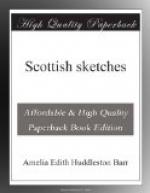These changes did not take place all at once, nor without much disputing. John Callendar opposed every one of them step by step till opposition was useless. David only submitted to them in order to purchase for himself a delusive peace during the few hours he could afford to be in his fine home; for his increased expenditure was not a thing he could bear lightly. Every extra hundred pounds involved extra planning and work and risks. He gradually lost all the cheerful buoyancy of manner and the brightness of countenance that had been always part and parcel of David Callendar. A look of care and weariness was on his face, and his habits and hours lost all their former regularity. It had once been possible to tell the time of day by the return home of the two Callendars. Now no one could have done that with David. He stayed out late at night; he stayed out all night long. He told Isabel the mill needed him, and she either believed him or pretended to do so.
So that after the first winter of her fashionable existence she generally “entertained” alone. “Mr. Callendar had gone to Stirling, or up to the Highlands to buy wool,” or, “he was so busy money-making she could not get him to recognize the claims of society.” And society cared not a pin’s point whether he presided or not at the expensive entertainments given in his name.
CHAPTER IV.
But things did not come to this pass all at once; few men take the steps towards ruin so rapidly as to be themselves alarmed by it. It was nearly seven years after his marriage when the fact that he was in dangerously embarrassed circumstances forced itself suddenly on David’s mind. I say “suddenly” here, because the consummation of evil that has been long preparing comes at last in a moment; a string holding a picture gets weaker and weaker through weeks of tension, and then breaks. A calamity through nights and days moves slowly towards us step by step, and then some hour it has come. So it was with David’s business. It had often lately been in tight places, but something had always happened to relieve him. One day, however, there was absolutely no relief but in borrowing money, and David went to his uncle again.
It was a painful thing for him to do; not that they had any quarrel, though sometimes David thought a quarrel would be better than the scant and almost sad intercourse their once tender love had fallen into. By some strange mental sympathy, hardly sufficiently recognized by us, John was thinking of his nephew when he entered. He greeted him kindly, and pulled a chair close, so that David might sit beside him. He listened sympathizingly to his cares, and looked mournfully into the unhappy face so dear to him; then he took his bank-book and wrote out a check for double the amount asked.
The young man was astonished; the tears sprang to his eyes, and he said, “Uncle, this is very good of you. I wish I could tell you how grateful I am.”




